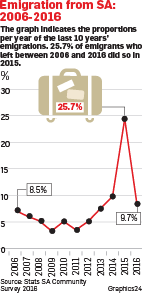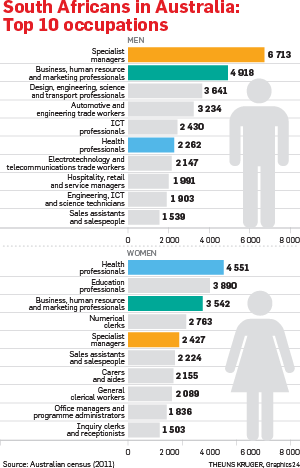
Emigrations from South Africa spiked in the year of Nenegate. But that is not the full story
Xenophobic attacks, bleak economic prospects and even load shedding might explain a recent spike in emigration identified in Stats SA’s just-released Community Survey, experts say.
The results of the household survey, released on June 30, show that more than a quarter of the 102 793 household members who emigrated in the 10 years to 2016 had done so last year.
According to the numbers, 4.6% left South Africa in 2009.
Stats SA included questions on emigration for the first time in this 2016 survey. The 2016 figure (9.7%) is for the first two months of the year only.
Christine Khoza, executive manager for population statistics at Stats SA, warns that the 2015 spike might in part be attributed to the fact that respondents would better recall recent emigrations (they were asked to provide information on emigrations of household members from 2006 to this year).
It “could also be owing to the xenophobic attacks on immigrants in the same year [2015]”, she says.
Chris Watters, a lawyer who runs an immigration, nationality and refugee law practice in Johannesburg, which also offers emigration services, says his practice saw a noticeable increase in enquiries in the first two months of last year.
“It went from one [query] every few weeks to nine or 10 a day,” he says.
45% THE PERCENTAGE OF EMIGRANTS IN THE AGE GROUP 25-39
Migration lawyer Chris Watters says there isn’t a typical emigrant, but his experience regarding age matches the findings of the Community Survey.
Close to 45% of emigrants are 25 to 39. The majority (54%) are male. Most (36%) are from Gauteng.
Migration Network Australia’s Marlene Prentice says the majority of her clients are white, qualified and skilled, but that is changing.
“Over the past 12 months I have seen a drop in age of people wanting to emigrate. The enquiries from the age group 22 to 30 are becoming significant.
“Although the majority of enquiries are from white and Indian people, I have this year started receiving enquiries from black professionals.”
Watters says the practice does not record the reasons clients leave the country, but when reasons were offered, “it was what you might diplomatically summarise as the decline in business confidence and looking for better opportunities for children”.
Watters says the number of queries has slowed down this year, but his practice still receives several inquiries a day.
Marlene Prentice, who runs Migration Network Australia, which facilitates emigration to Australia, says her business experienced a spike in the number of South Africans relocating to Australia in January last year, and then again in July and December last year, after the sacking of finance minister Nhlanhla Nene.
“The number of visa assessments processed in July and December 2015 were 67% higher than the number processed in July and December 2014.
This increased trend continued through to January and February this year,” says Prentice.
“The main reasons given are security, corruption and a lack of future job prospects. However, in July 2015, the load shedding issue was raised. The sacking of Nene and the volatility of the rand became an additional reason after December 2015.”
Australia is the top destination outside Africa for South African emigrants, according to the Community Survey, followed by the UK, the US, New Zealand and Germany.
Rainer Breul, spokesperson for the German embassy in Pretoria, says that while they cannot comment on the reasons South Africans are emigrating to Germany, there was a slight increase in the numbers last year.
“In 2014, 5 120 people emigrated to Germany from South Africa, whereas in 2015, it was 5 308 people. Therefore, a slight increase can be seen. However, the increase seems, from our view, too marginal to make out a real trend,” Breul says, adding that the embassy is not expecting a drastic increase in the number of South Africans emigrating to Germany in future.
Financial considerations played a role in Lauren Torlage’s decision to move to the UK.
Lauren (30), who has an honours degree in counselling psychology, grew up in Johannesburg.
“I feel that the instability of the politics, as well as the high occurrence of corruption, have made me lose faith in the leadership of our country.
“The outcome of that has also been economic instability and the rand being in a precarious position against the dollar and the pound.”
Lauren is an avid traveller and found that because of the exchange rate, she couldn’t travel to Europe and the US.
“It was becoming ever more expensive and late last year, when our minister of finance was dismissed, I lost further faith when the rand took a serious dip.
“I am saddened by how much money is misspent in South Africa and not directed to the people who need it.”
For her, the hardest part of emigrating to the UK this year has been leaving her friends and family behind.
“I miss them every day. But I try to keep my eye on my future and the possibilities I have here. The jobs in the social sector are far better, easier to come by and [better] paid.
“The lifestyle in the UK is also different, with a focus on work-life balance, family time and social and wellness activities, and encouragement to travel.”
She is yet to decide if it’s a “forever decision”, but says that “there is very little calling me home” at the moment.
According to the Community Survey, Mozambique and Zimbabwe are the most popular destinations for South African emigrants.
This might be explained by the fact that respondents were not asked about their citizenship, so not only South African nationals would have been included in the results.
Stats SA notes that the emigration figures in the Community Survey is probably an undercount because “the count is limited to those individuals who still have family members remaining in the country”.
Therefore, if an entire family had emigrated, they would not be counted.




 Publications
Publications
 Partners
Partners










